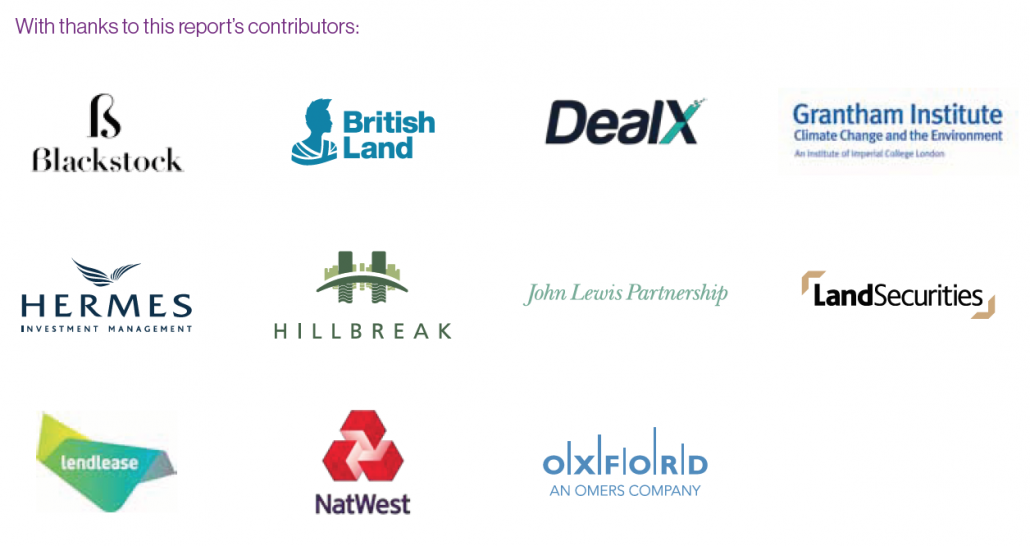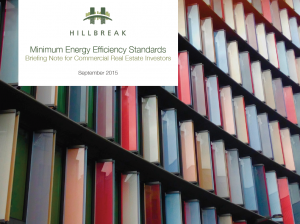Potential £10bn rental bombshell just twelve months away
London – Friday 14 April 2017
Potential £10bn rental bombshell just twelve months away in buildings failing green standards
Research on the impact of new green standards has estimated the value of failing commercial property in England and Wales could be as much as £10bn in annual rents.
The estimate is based on data included in a major new report by global advisory, broking and solutions company Willis Towers Watson, which calls for radical policy measures to green the UK’s building stock.
The report, to which Hillbreak was a principal contributor, contains research by big data firm DealX showing that nearly a fifth of commercial properties in England and Wales are currently failing the Minimum energy efficiency standards (MEES) due to come into force from April next year.
The research has found over 115,000 commercial buildings – 17.5 percent of those rated – in England and Wales have Energy Performance Certificates (EPC) rated F or G. Landlords will be forbidden from re-letting commercial buildings with EPCs below E from next April.
Analysis of the figures by property consultancy Daniel Watney LLP based on the EPC data and the new business rates valuations estimates that the equivalent annual rental value of F or G-rated commercial buildings could be as much as £10bn. Figures released by the Investment Property Forum last year estimated the annual 2015 value of UK commercial property rents to be £55bn.
The Willis Towers Watson Real Estate Climate Risk Report brings together major listed firms and high street names including British Land, Land Securities, Lendlease, NatWest and the John Lewis Partnership to examine how to best bring property up to standard and help the UK meet the targets enshrined in the Paris Agreement, the world’s
The listed firms say that while they can leverage their economies of scale and the latest technology to achieve substantial energy efficiency gains, the key challenge will be to get smaller businesses to green their buildings.
Recommendations in the report for greening real estate include:
- Government funding for a mass retrofitting programme
- Ratcheting up the minimum energy efficiency standard to an EPC D rating by 2020
- The industry-wide adoption of Display Energy Certificates
- Potentially combining DECs with science-based targets in future legislation to drive ongoing emissions reductions
The report also details the potential harm to real estate if action is not taken to limit climate risk, proposing tougher stress testing and increased translation of climate risk to balance sheets. Many firms are not adequately insured against extreme weather events, as seen in the wake of the UK’s 2015/16 winter floods, which caused £600m in uninsured damage.
Paul Chetwynd-Talbot, managing director of the real estate practice at Willis Towers Watson, said:
“Buildings create 40% of carbon emissions and the fact than one in five properties are falling short of standards is worrying. Investors – many of whom are pension funds – increasingly recognise the risks associated with climate change. But we need to see more affirmative action from Government to help retrofit older buildings and drive forward take up of renewable energy.”
Miles Keeping, co-founder and director of sustainability consultancy Hillbreak, said:
“It is of course impossible to identify the precise value of the total rents at risk due to MEES. But relying on rateable value data gives us a very tangible sense of the money landlords are putting at risk if they do not attend to their EPC-related risks appropriately and very soon.”
Martin Siegert, co-director of the Grantham Institute for Climate Change and the Environment at Imperial College London, said:
“The need to decarbonise our economy is critical. It is going to be a profound change: the developed world will need to have no net carbon emissions by 2050. Ending emissions from our electricity system, manufacturing, transport and supply chains will be challenging enough for our larger companies, but we will need all of our smaller companies to achieve this too.”
Sarah Cary, head of sustainable places at British Land, said:
“Retrofitting old buildings on a mass scale requires a far more complex solution than simple tax incentives to replace boilers or windows. Retrofitting should be set as a priority for a national infrastructure programme.
“The benefits would be twofold: it would be a boon for job creation, and it would work wonders in helping reach energy goals.”
Paul King, managing director of sustainability at Lendlease Europe, said:
“We need to make sustainability easier for everyone to engage with – both in terms of consumers and companies. An industry-wide agreement to have LCD screens on the front of every building showing real-time energy use would be more than welcome. Just as with the example of energy labelling on white goods, while it may not directly cause many consumers to switch from one business to another, the incentive to a CEO to avoid having a negative label compared with a competitor could generate real results in driving businesses to retrofit their buildings.”
Caroline Hill, head of sustainability at Land Securities, said:
“Changes in technology and the ability to access growing pools of data have allowed us to set increasingly ambitious commitments to reduce both energy intensity and emissions by 40% per square metre by 2030. If more leading businesses agreed to using 100% renewable power, this could provoke a serious step-change in how society approaches the challenges we face.
“Giving property owners a hard stop deadline to improve buildings or lose the right to rent them out has clearly had some positive effect. Ratcheting MEES so all buildings must be at least D grade by 2020 would provide the impetus for inefficient buildings to get the investment they need.”
Andrew McAllan, managing director of Oxford Properties Group and chairman of the Canadian Green Building Council, said:
“Most ‘Tier 1’ companies – those with the greatest capital reserves and profits – are by and large already taking the necessary action on making their buildings greener and making more efficient use of energy. It’s that next level down of ‘Tier 2’ companies that need engaging and support. Mandatory reporting of energy consumption would be useful: what gets measured gets managed.
“The best sustainability strategies are built on a foundation of good data, and there are ways of bringing in these measures without making them onerous for smaller businesses. Once you have that compulsory recording in place, smaller businesses then see the easy efficiencies they can make on their utility costs. Combined with something like carbon pricing to add impetus to the need to invest in more efficient installations, that is how we can effect the change we need.”
Richard Garner, head of commercial agency at property consultancy Daniel Watney LLP, said:
“As our research into the value of England and Wales’ F and G rated buildings shows, many investors in commercial property face a ticking timebomb with their properties being potentially unlettable from April next year – this is particularly the case in the office hotspots of Westminster, Kensington and the City, which have commercial space with a collective annual rental estimate of nearly £800m currently not up to standard.
All the evidence demonstrates that adding sustainable features to offices adds value and drives worker productivity and satisfaction, advantages that will serve landlords well over the long term.”
Jon Lovell, co-founder and director at sustainability consultancy Hillbreak, said:
“It is important that that the government clarifies some of the glaring gaps in the confusing regulations. Many large fund managers and REITs are on top of them, but we have a real concern for the long tail of smaller landlords, businesses and family trusts, who own a disproportionate amount of F&G rated properties and will suffer if they don’t get their acts together very quickly.”
— ENDS —

Contributors to the Willis Towers Watson Real Estate Climate Risk Report 2017 included Hillbreak, British Land, Land Securities, Lend Lease, Oxford Properties, John Lewis Partnership, Nattiest, Hermes Investment Management, Blackstock, Grantham Institute for Climate Change & the Environment and DealX.
For more information, please contact Blackstock Consulting / Tyron Wilson / tyron@blackstockpr.com / 07725 197364
Notes for editors
Daniel Watney LLP is not a contributor to the report, but their research on the value of F + G-rated property is based on the DealX data within the report. The rental estimates are based on the latest rateable values used to calculate business rates, calculated using the average rateable value in each local authority and the number of F + G-rated buildings in each district.
About Willis Towers Watson
Willis Towers Watson (NASDAQ: WLTW) is a leading global advisory, broking and solutions company that helps clients around the world turn risk into a path for growth. With roots dating to 1828, Willis Towers Watson has 40,000 employees serving more than 140 countries. We design and deliver solutions that manage risk, optimize benefits, cultivate talent, and expand the power of capital to protect and strengthen institutions and individuals. Our unique perspective allows us to see the critical intersections between talent, assets and ideas – the dynamic formula that drives business performance. Together, we unlock potential. Learn more at willistowerswatson.com.
About Hillbreak
Hillbreak is a unique training and advisory firm that helps organisations seeking competitive advantage in a changing urban world. Its mission is to expedite the transition to a sustainable policy, business and investment environment by bringing intelligence, challenge and inspiration to its clients and stakeholders. Please visit hillbreak.com for further information or follow us on Twitter, Facebook, and LinkedIn.









